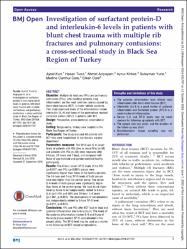Investigation of surfactant protein-D and interleukin-6 levels in patients with blunt chest trauma with multiple rib fractures and pulmonary contusions: a cross-sectional study in Black Sea Region of Turkey

Göster/
Erişim
info:eu-repo/semantics/openAccessTarih
2016Yazar
Kurt, AyselTürüt, Hasan
Aıipayam, Ahmet
Kırbaş, Aynur
Yüce, Süleyman
Cüre, Medine Cumhur
Cüre, Erkan
Üst veri
Tüm öğe kaydını gösterKünye
Kurt, A., Turut, H., Acipayam, A., Kirbas, A., Yuce, S., Cure, M.C. & Cure, E. (2016). Investigation of surfactant protein-D and interleukin-6 levels in patients with blunt chest trauma with multiple rib fractures and pulmonary contusions: a cross-sectional study in Black Sea Region of Turkey. Bmj Open, 6(10). https://doi.org/10.1136/bmjopen-2016-011797Özet
Objective: Multiple rib fractures (RFs) and pulmonary contusions (PCs), with resulting systemic lung inflammation, are the most common injuries caused by blunt chest trauma (BCT) in motor vehicle accidents. This study examined levels of the inflammation marker interleukin (IL)-6 and those of the acute-phase reactant surfactant protein (SP)-D in patients with BCT. Design: Prospective, cross-sectional, observational study. Setting: Single-centre, tertiary care hospital in the Black Sea Region of Turkey. Participants: the study included 60 patients with BCT who were hospitalised in our thoracic surgery department. Parameters measures: the SP-D and IL-6 serum levels of patients with RFs (two or more RFs) (n=30) and patients with PCs (n=30) were measured after 6 hours, 24 hours and 7 days, and compared with those of age-matched and gender-matched healthy participants. Results: the 6-hour serum SP-D levels of the RFs (p=0.017) and PCs (p<0.001) groups were significantly higher than those of the healthy controls. the 24-hour and 7-day SP-D levels of both groups were also higher than the control group. the serum IL-6 levels of both groups were significantly higher than those of the control group. We have found Injury Severity Score to be independently related to 6-hour IL-6 (beta=1.414, p<0.001) and 24-hour IL-6 levels (beta=1.067, p<0.001). the development of complications was independently related to 6-hour SP-D level (beta=0.211, p=0.047). Conclusions: RFs and PCs after BCT lead to local and systemic inflammation due to lung injury. the levels of the systemic inflammation marker IL-6 and those of the acute-phase reactant SP-D were elevated in the present study. the SP-D level may be used as a marker in the follow-up of BCT-related complications.

















